What Types of Cockroaches Live in New England?

One of the most resilient pests are cockroaches. According to Census.gov, cockroaches have been spotted in about 10% of homes in the United States. These dirty insects can be found in almost all places, including restaurants, farms, offices and of course homes. Cockroaches are attracted to food, moisture, and dark, sheltered places. Here in New England, there are five different types of cockroaches that are commonly found, each of which we’ll touch on in this article. If you have any questions about cockroaches or are looking for a cockroach exterminator in Massachusetts or New Hampshire, please contact Absolut Pest Control today for a free estimate!
German Cockroach
German cockroaches are some of the most commonly found cockroaches in New England. German cockroaches are typically about ½” long, oval-shaped, and light brown in color. These cockroaches are not native to New England (or the United States in general), but have likely been here since the late 18th century. These cockroaches are highly allusive, and when an infestation begins, they often require professional extermination services to eradicate.
Brown-Banded Cockroach
Brown-banded cockroaches are another common cockroach species in the 6 New England states. Much like German cockroaches, brown-banded cockroaches are about ½” in length with brown, oval-shaped bodies. The easiest way to differentiate between these two cockroach species is that brown-banded cockroaches have two light brown-colored bands that wrap around their bodies. These cockroaches have been found in the USA since the early 1900s. Brown-banded cockroaches prefer warm environments, so you may find them in your home near appliances that give off heat.
Oriental Cockroach
Oriental cockroaches are larger and darker in color than the two above-mentioned roach species, as they are typically about 1” long and dark brown to black in color. These cockroaches prefer cooler, moist environments, so they are often found in drains, sewers, and under debris like wet leaves.
American Cockroach
American cockroaches are the largest cockroaches that are commonly found in New England, as they are typically at least 1 ½” long. These cockroaches are brownish-red in color with a light brown band behind their heads. Despite their name, American cockroaches are not native to the Americas; they are native to Africa and are believed to have been brought to the United States during the 1600s. Like oriental cockroaches, American cockroaches are often found in drains and sewers because they prefer dark, humid environments.
Smoky Brown Cockroach
Smokey brown cockroaches are a shiny, brownish-black roach species that are typically 1”-1 ½” in length. These cockroaches are often confused for American cockroaches because of their similar appearance, but smoky brown cockroaches do not have the light brown band behind their heads that American cockroaches do. Smoky brown cockroaches are most commonly found outdoors in leaf piles, mulch, and other dead organic matter.
Contact Absolut Pest Control For Cockroach Extermination Services!
If you have any questions about cockroaches or are currently experiencing a roach infestation at your Massachusetts or New Hampshire home or business, please contact our team at Absolut Pest Control today! We provide home and business owners in MA & NH with a wide range of affordable pest removal & extermination services! Get a free pest control estimate today by calling us at (978) 388-4589 or by filling out the contact form on our website!
How To Prevent Earwig Infestations In Your Home
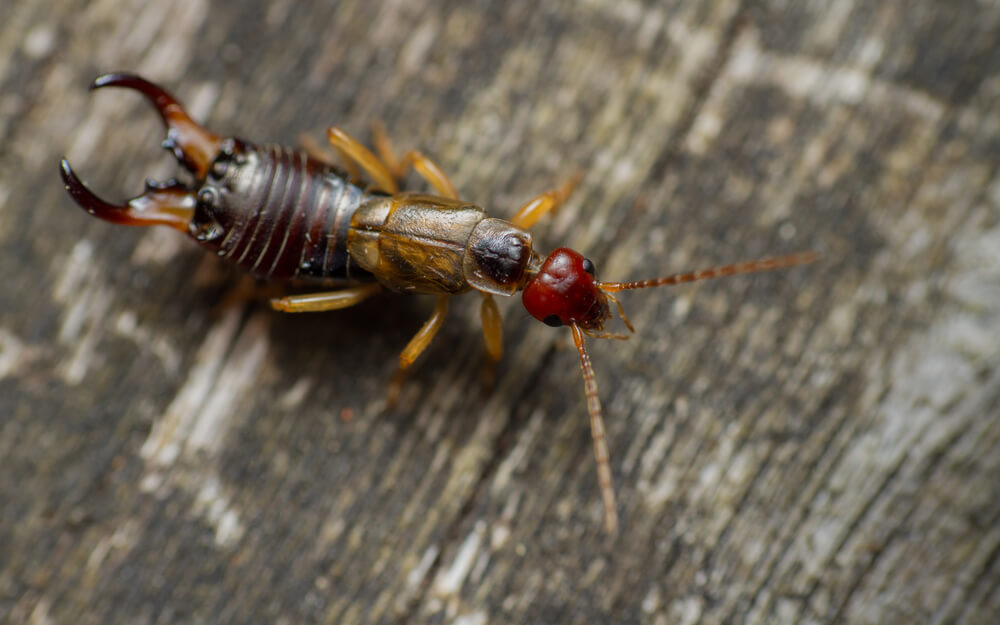
Earwigs are a menacing-looking insect due to the large pincers that are located on the back side of their abdomen, but these pests are harmless for the most part. Legend has it that earwigs got their name from the suspicion that they would crawl into people’s ears when they sleep, but this rumor has no scientific basis and is most likely false. Even though earwigs are not particularly harmful, they are still an unsanitary insect that you should aim to keep out of your home or business! In this article, we’ll offer you some tips on how to prevent earwig infestations in your home! If you have any questions about earwigs or would like a free estimate on an insect control service at your Massachusetts or New Hampshire home, please contact our team at Absolut Pest Control today!
Limit Excess Moisture In Your House
Earwigs are attracted to moist, secluded environments, so one of the best ways to prevent infestations in your home is to limit any excess moisture in cabinets, basements, bathrooms, etc. If you’ve noticed earwigs in your home recently, you should perform a thorough inspection for pipe leaks or other sources of moisture that may be attracting these insects.
Seal Gaps & Cracks In Foundation & Walls
Earwigs’ most common entry point into homes is through cracks, gaps, or holes in the walls or foundation of the home. Sealing up these cracks with caulking or liquid cement is an excellent way to prevent earwig infestations, but can also prevent infestations from a wide range of other insects and rodents.
Landscaping Around Your Home
One more way to prevent earwig infestations in your home is to be vigilant about the landscaping in your lawn. As mentioned above, earwigs are attracted to moisture, so removing moisture-filled items from the perimeter of your home can help prevent infestations inside. Be sure to clean up leaf piles, trim back vegetation, and store wood piles at least 10 feet from your house!
Contact Absolut Pest Control!
If you have any questions about preventing earwig infestations or are currently experiencing a pest problem at your Massachusetts or New Hampshire home, please contact our team at Absolut Pest Control! We provide home and business owners in the region with a wide range of affordable pest removal & extermination services! Contact us today to get a free estimate by giving us a call at (978) 388-4589 or by filling out the contact form on our website!
Tips On Pest-Proofing Your Home For The New England Winter
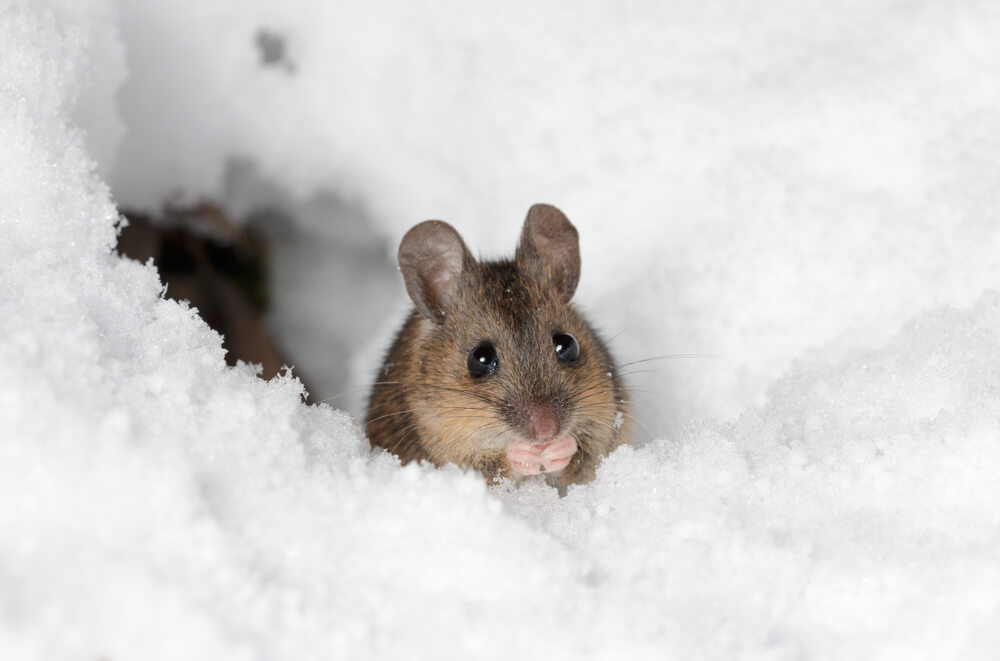
The cold wintertime in New England can drive a wide range of pests into your home that are seeking shelter. Some of the most common winter pests in New England and the surrounding regions are rodents, carpenter ants, cockroaches, stink bugs, ladybugs, bed bugs, earwigs, and more. In this article, we’ll give you some tips on how you can prepare your home for the wintertime in order to prevent pest infestations from rodents, insects, and more! If you have any questions about pest prevention or are currently experiencing a problem with any kind of pest at your northeastern Massachusetts or southern New Hampshire home, please contact our team at Absolut Pest Control today for a free pest control estimate!
Seal Gaps & Cracks Around The Exterior Of Your Home
One of the best ways to prevent rodent and insect infestations in your home during the wintertime is to ensure that these pests can never enter the house in the first place! To do this, you should perform a thorough inspection of your house’s foundation, doors, windows, and siding. If you notice any cracks or gaps anywhere on the exterior of your home, you should be sure to seal them up in order to prevent pests from entering through them. Even if the crack or gap seems insignificant, they should still be sealed, as adult mice can squeeze through spaces that are only about the size of a dime. In order to seal off cracks and gaps, you can use screens, caulking, spray foam, steel wool, and more.
Landscaping Around Your House
Another great way to prevent pest infestations during the wintertime is to keep up with the landscaping around the exterior of your house. You should be sure that any tree branches around your house are trimmed back to at least 10 feet from your roof, as they can act as a bridge for insects and rodents. Additionally, piles of firewood should be placed at least 5 feet from your home’s walls, as pests living in these stacks could otherwise gain easier entry into your house. Finally, be sure to properly deal with the leaves that fall from the trees around your house, as pests often live and hide underneath debris. Rake your yard regularly to keep up with leaves and clean out your gutters!
Properly Dispose Of Garbage
One more way to prevent pest infestations this winter is to be vigilant about the way you store and dispose of your trash. Improper garbage storage is one of the most surefire ways to attract pests to your home, especially during the wintertime when pests’ typical food sources are more scarce. Be sure that your trash and recycling bins have tight fitting lids that are being utilized while the trash is still in your home and while it’s on the curb awaiting pickup, as rodents and small mammals like raccoons may try to break into your trash cans to find an easy meal. You should also be sure to regularly clean your trash cabinets in order to pick up any spills and crumbs that may be attracting ants, mice, and other pests!
Contact Absolut Pest Control!
If you have any questions about preventing pest infestations in the wintertime or are currently experiencing a pest problem at your Massachusetts or New Hampshire home, please contact our team at Absolut Pest Control! We provide home and business owners in the region with a wide range of pest removal & extermination services at affordable prices! Contact us today to get a free estimate by giving us a call at (978) 388-4589 or by filling out the contact form on our website!
What Are Powderpost Beetles?

“Powderpost beetle” is a term that refers to several species of beetles that tunnel through wood, damaging the structural integrity of whatever they are attacking. There are three different families of beetles that can be classified as powderpost beetles: Lyctidae, Bostrichidae, and Anobiidae. Because powderpost beetles are wood damaging insects, they are often mistaken by homeowners for termites or carpenter ants when they begin to attack a house. Without actually being able to see the beetles themselves, the best way to differentiate powderpost beetle infestations from other wood-damaging insects is to look at the damage they’ve caused. Powderpost beetles create narrow, circular tunnels in the wood they are burrowing through, leaving behind a powdery, sawdust-like material. Below, we’ll dive deeper into the three main types of powderpost beetles so that we can help you identify the insects that are damaging your home! If you have any questions about powderpost beetles or are a Massachusetts homeowner that is currently struggling with a wood-damaging insect problem, please contact our team at Absolut Pest Control for a free pest control & extermination estimate!
Lyctid Powderpost Beetles
Lyctid powderpost beetles are typically 1/16-1/4 inch long with reddish-brown bodies. Lyctid powderpost beetles most commonly target newly manufactured products with wood that is less than five years old, and infestations are often caused by wood that already contained eggs or larvae at the time the product our house was built. Lyctid beetle infestations are especially common in tropical hardwoods, as the storage and drying process for these types of woods prior to their arrival in the USA can attract the insects.
Bostrichid Powderpost Beetles
Bostrichid powderpost beetles range in size from 1/8-1/4 inch long with elongated, cylindrical bodies. While these beetles are similar in color to Lyctid powderpost beetles, they can be differentiated by their downward-facing heads and rough-textured thorax. Bostrichid powderpost beetles target both seasoned softwood and hardwood, and their damage can often be found in unfinished hardwood flooring, furniture, & other wood products with high starch and moisture content.
Anobiid Powderpost Beetles
Anobiid powderpost beetles are the most dangerous family of powderpost beetles that homeowners can face a problem with because they can seriously damage homes by tunneling through beams, joists, and other essential structural elements of houses. These beetles have similar appearances to the other powderpost beetles mentioned above, but their life cycle is significantly longer, sometimes lasting up to ten years. Anobiid powderpost beetle damage can be found in both hardwood and softwood products like subflooring, plywood, paneling, molding, flooring, and furniture.
Contact Absolut Pest Control!
If you have any questions about identifying, preventing, or treating a powderpost beetle infestation in your Massachusetts or Southern New Hampshire home, please contact our team at Absolut Pest Control! We provide various pest removal and extermination services at affordable prices throughout the region! Give us a call today at (978) 388-4589 or fill out the contact form on our website!
Everything You Need To Know About June Bugs
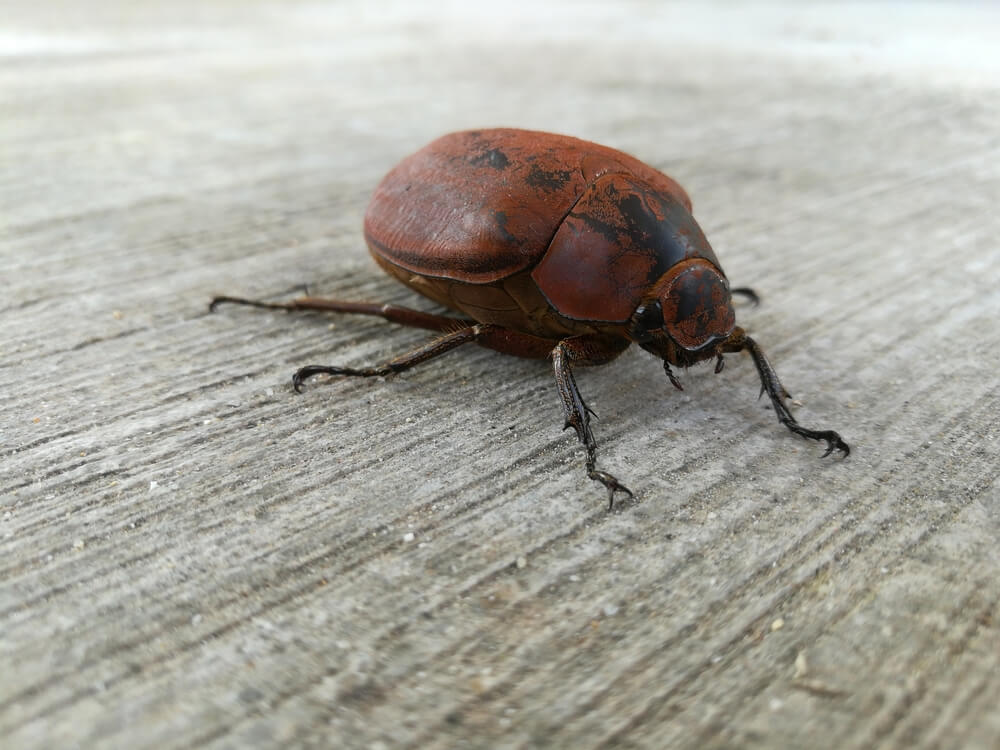
June bugs, also known as June beetles or May bugs, are scarab beetles that are commonly found on the east coast during the early to mid-summer, which is where they get their name from. June bugs are much larger than the average beetle found in New England, as they are typically ½” to 1” long. These beetles are reddish-brown with fat, oval shaped bodies and six legs. There are nearly 300 species of June bugs, but the most prevalent are the common June bug and the green June beetle.
Are June Bugs Harmful?
While June bugs do not bite and will very rarely infest homes, they can be harmful to the plants around your home and in your garden. While adult June bugs can damage plants by feeding on their leaves, they are most harmful when they are in their larvae stage. Adult June bugs lay their eggs in the soil, and the larvae that hatch out of these eggs are called white grubs. White grubs feed on the roots of grass and garden plants, which cuts off the plants ability to absorb nutrients, quickly killing them. To make matters worse, June bug larvae attract moles and other subterranean rodents, which can also eat crops and damage yards & gardens.
How Can I Prevent June Bugs?
There are a few different signs that can point to a June bug problem around your home:
- June bug sightings
- Patches of dead, brown grass around your lawn
- Ragged holes in plant leaves
- Noticing an influx in mole populations
- Small holes appearing in your lawn
If you notice any of these signs in May, June, or early July, there is a good chance that you have a June bug problem around your home! The good news is that there are a few different ways to prevent June bug infestations:
- Reduce fertilizer & chemical use on your plants, which will increase the number of natural predators that kill June bug larvae.
- Attract birds to your home with bird feeders and bird baths. These birds will eat adult June bugs, and some species will eat the white grubs out of the ground.
- Remove debris and dead grass from your lawn, which will help nutrients, air, and water reach the soil and can help reduce white grub populations.
- Hire a pest control professional to treat your lawn.
Contact Absolut Pest Control!
If you have any questions about June bugs or believe that you have a pest problem in or around your Massachusetts or New Hampshire home, contact Absolut Pest Control! We provide various pest removal services at affordable prices throughout the region! Contact us today by giving us a call at (978) 388-4589 or by filling out the contact form on our website!
Tips On Dealing With Horse Flies This Summer
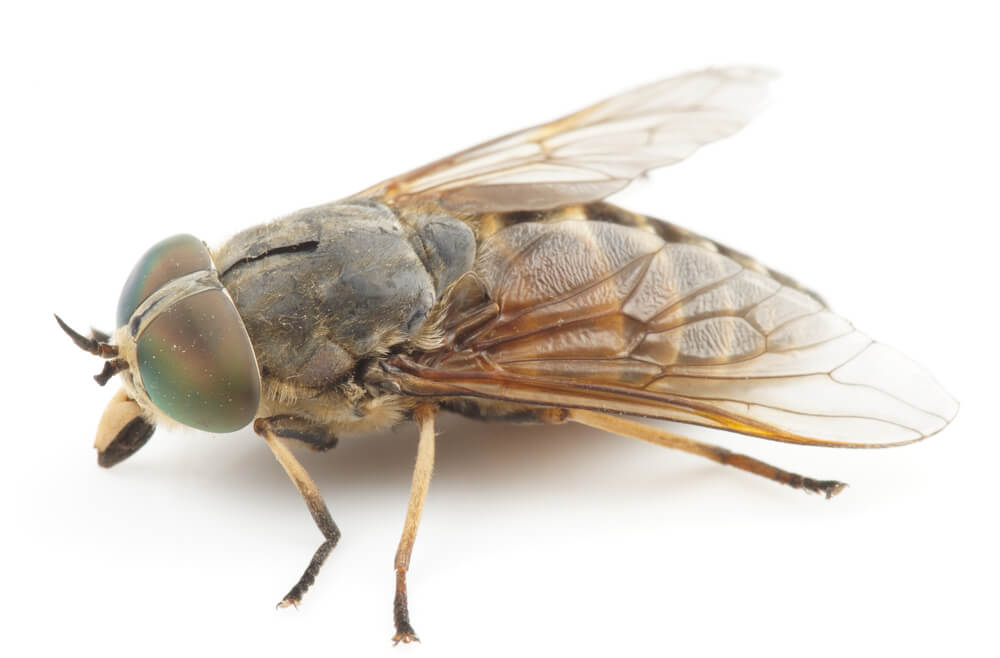
As the warmer weather approaches here in New England, so do the pests that come with it, like mosquitoes, ticks, yellowjackets, hornets, ants, and perhaps the most annoying of all, horse flies. Horse flies are larger than average house flies, usually with lengths of around ½” to 1 ¼”. Female horse flies feed on human & animal blood, and they have blade-like mouthparts that tear the skin, and unlike mosquitos, horse flies do not release any anesthetic when they bite, making the bites extremely painful. Horse flies are relentless and will continue to attempt to bite you until they either do so or have been killed. Horse flies are not known to be vectors of disease, but their bites can cause allergic reactions, itchiness, and swelling.
How To Prevent Horse Flies From Frequenting Your Property
If you’ve noticed an influx of horse flies around your home, there are a few things you can do to try to get rid of them, or at least limit their numbers. Horse flies love to hang out around hot, damp areas like streams and ponds, but long grass and weedy areas can also produce enough humidity to attract them. For this reason, maintaining a well-kept yard by mowing and weeding regularly is a great way to limit the number of horse flies around your house. Horse flies, and most other fly species, are also attracted to garbage, so it’s important that your outdoor trash bins are well-sealed with a snug fitting lid. One more way to keep your outdoor space horse fly-free is to burn citronella candles or tiki torches. The smoke and smell that citronella oil produces repels horse flies, mosquitos, and other insects, making these candles and tiki torches great for backyard barbecues and other outdoor activities. If you are facing a serious problem with horse flies, your best bet is to consult a pest control specialist who can professionally treat your property with insect repellents!
Contact Absolut Pest Control!
If you have any questions about pest control this summer or believe that you have a pest problem at your Massachusetts or New Hampshire home, contact Absolut Pest Control! We provide various insect extermination and pest removal services at affordable prices throughout the region! Contact us today by giving us a call at (978) 388-4589 or by filling out the contact form on our website!
Tips For Fruit Fly Prevention & Extermination
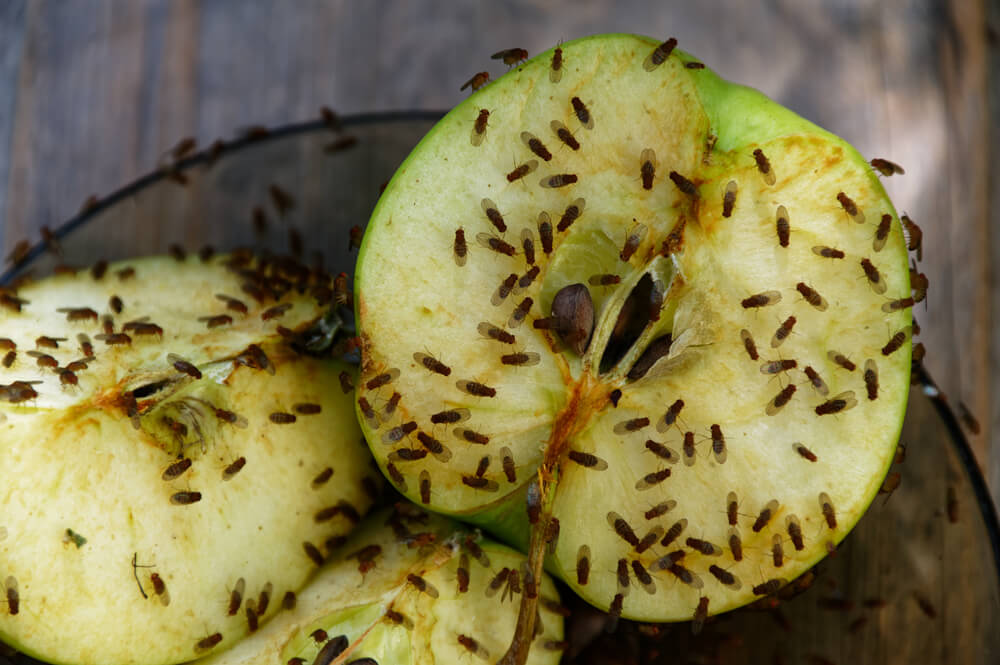
Fruit flies are common household pests that are attracted to fruit and other sweet substances. These miniature flies are typically around 1/8th of an inch long with black or tan bodies and red eyes. Because of their appearance, fruit flies are sometimes confused for gnats. Fruit flies like to lay their eggs on rotting fruit or other organic materials, where the eggs will hatch about a day later and the larvae will continue to feed on the fruit or other fermenting material. While fruit flies do not sting or bite, they can be dangerous because they can spread bacteria and foodborne illnesses throughout your home or business. In this article, we’ll give you some tips on how you can prevent and exterminate these miniature pests! If you are a Massachusetts resident that is having trouble dealing with fruit flies or other insects, Absolut Pest Control is here to help! Contact us today for a free estimate on our pest control services!
Fruit Fly Prevention Tips
The best way to deal with a fruit fly problem is to never get them in the first place! You can prevent fruit flies in your home or business with just a few simple steps:
- Eliminate Sources Of Attraction: Fruit flies are primarily attracted to ripe or rotting produce. Be sure that any ripe produce you have is either stored or discarded properly! Store your fruits & vegetables in air tight containers in the refrigerator, or if you’re throwing something away, make sure it goes into a sealed container with a trash can liner!
- Clean Thoroughly: The next way to prevent fruit flies is to clean up thoroughly after any food or drink spill. Not only are fruit flies attracted to produce, but they also feed on soda, juice, beer, wine, and garbage. Anytime a liquid spills on your floor or countertop, be sure to clean it up with kitchen spray to ensure that nothing is left for insects to feed on!
- Properly Deal With Cracked Or Damaged Fruits: If you have any cracked or damaged fruit, you should cut off the wounded portion because this is where fruit fly larvae may be present.
Fruit Fly Extermination Tips
Fruit flies breed extremely quickly, so it’s important to eradicate the infestation in your home or business before it can get out of hand. While the best way to handle a fruit fly problem is to hire a pest control specialist, there are a few home “remedies” that you can try to exterminate the fruit flies on your own:
- Throw away all fruit and other ripe or rotting substances
- Clean rooms where the fruit flies are present thoroughly
- Create a trap using a jar & paper funnel, with apple cider vinegar as bait
- Use an aerosol insecticide
Contact Absolut Pest Control!
If you have any questions about fruit flies or any other insects, contact our team at Absolut Pest Control today! We provide a wide variety of affordable pest control services for insects and many other pests in Massachusetts and Southern New Hampshire! Give us a call at (978) 388-4589 or fill out the contact form on our website, and we’ll get back to you as soon as possible!
Frequently Asked Questions About Bed Bugs
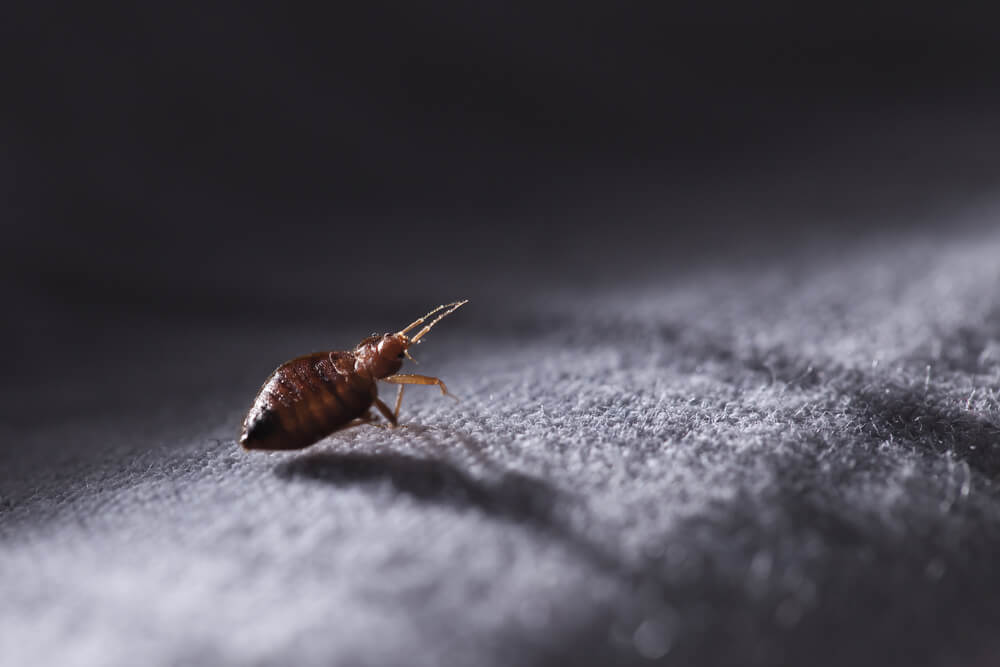
What Are Bed Bugs?
Bed bugs are small insects (often about the size of an apple seed) that feed on the blood of people and animals. These parasites have flat, brown bodies when they haven’t eaten recently, and balloon-like, reddish-brown bodies when they have been fed. When bed bugs bite, they leave several small red bumps in a line or zig-zag pattern. Female bed bugs lay hundreds of eggs in their lifetime (around 4 months to 1 year), so it’s important to deal with an infestation before it has the chance to get out of hand!
What Are The Signs Of A Bed Bug Infestation?
Bed bugs get their name from the fact that they are often found on beds and other furniture! Bed bugs are “hitchhikers”, meaning they often find their way into homes by catching a ride with pets, people, luggage, used furniture, and anything else that is brought into the house. Oftentimes, bed bug infestations are discovered after people notice that pattern of bed bug bites that are left on their bodies. Bed bugs also sometimes leave rust colored marks on mattresses, sheets, and carpets, which are the result of the insects’ feces. If you see the signs of a bed bug infestation in your home, you should contact a pest control professional right away before the infestation can get worse!
How Do You Treat A Bed Bug Infestation?
Although bed bugs typically do not present a serious threat to your health, it’s crucial to get rid of them as soon as they’re discovered. There are DIY methods that you can use to try to get rid of the bed bug infestation in your home, but they are typically not as effective as professional treatments. Some of these DIY treatments include:
- Washing clothes and bedding then drying them at a high heat
- Freezing clothes and bedding in a sealed bag for multiple days
- Using a steam cleaner to treat carpets, mattresses, and furniture
The best way to treat a bed bug infestation is to hire a professional. A professional pest control company will use a whole-room heat treatment using specially designed equipment that raises your home’s temperature above the limit that bed bugs & their eggs can survive (usually around 140 degrees). Using this professional heat treatment method is the only true way to get rid of every bed bug in your home!
Contact Absolut Pest Control!
The best way to solve a bed bug infestation is to hire a local pest control professional! Absolut Pest Control provides the Greater Boston region with pest control & removal services for a wide variety of pests, including bed bugs, other insects, mice, rats, bats, birds, termites, small mammals, and much more! Give us a call today at (978) 388-4589 or fill out the contact form on our website, and we’ll get back to you as soon as possible!
What Are Silverfish?
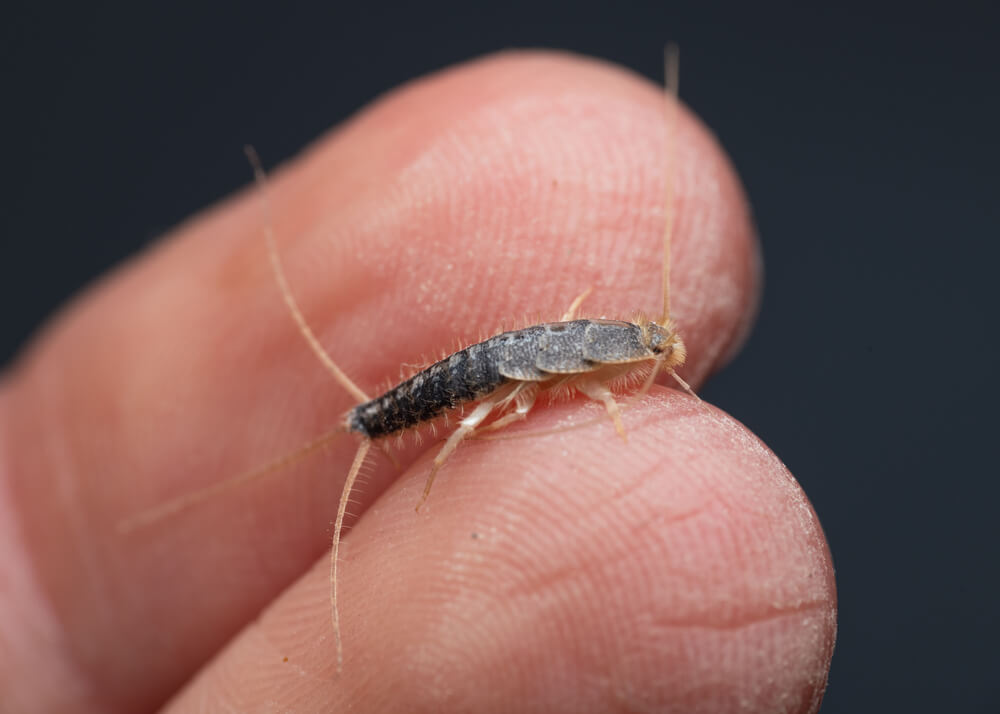
A silverfish is a small, silverish-brown insect that is typically around ¾ of an inch long. Silverfish differ from other common insects like ants, beetles, and flies because they are primitive insects, meaning they almost look like a fossil that has come to life. Silverfish can move extremely quickly, sometimes looking like they are swimming across the ground, hence their name. These insects have six legs with long antennae and three additional appendages that stem from the end of their bodies, but they do not have wings. Silverfish are known to feed on and cause damage to a wide variety of items that might be found in your home: books, clothes, wallpaper, flour, sugar, coffee, oats, and much more. These insects often thrive in dark yet humid environments, such as basements, attics, bathrooms, pantries, laundry rooms, and any other place in a home that may have those characteristics. While silverfish are not particularly dangerous, they are considered a nuisance pest that can cause damage to items in your home and trigger allergies.
Should I Be Concerned About A Silverfish Infestation In My Home?
As mentioned above, silverfish do not pose any serious concerns to you or the other people living in your home. However, this does not mean that you want these insects living in your home. Silverfish are known to breed rapidly, meaning an infestation could get out of control faster than you may think. Additionally, silverfish can get into paper products and dry food items, both of which they feed on. If you notice that a silverfish has gotten into a bag of flour, coffee, sugar, or any other type of food, you should dispose of it as they are unsanitary insects. One more reason that silverfish can be a concern is that some people may be allergic to their dropping and shed scales, leading to symptoms like sneezing, itching, coughing, and other common allergy symptoms. Signs of a silverfish infestation include:
- Seeing live silverfish
- Silverfish dropping & shed skin
- Silverfish damage
Contact Absolut Pest Control!
If you believe your Massachusetts home contains a silverfish infestation, the best way to deal with it is to contact a pest control professional. Our team at Absolut Pest Control has years of experience dealing with a wide variety of pests, including insects, rodents, birds, bats, small mammals, and much more! Contact us today by giving us a call at (978) 388-4589 or by filling out the contact form on our website!
Tips On Getting Stink Bugs Out Of Your Home
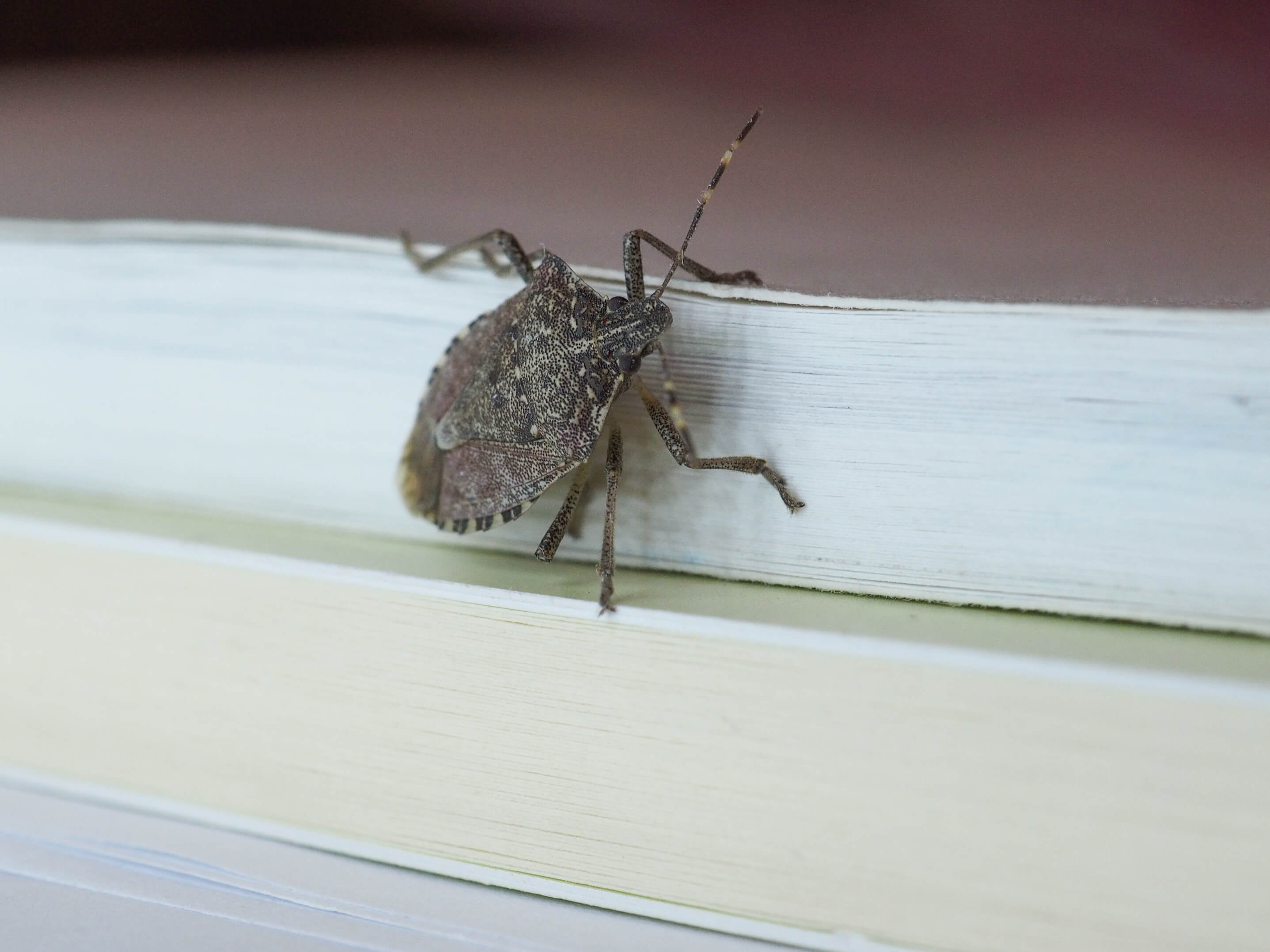
Brown Marmorated Stink Bugs – more commonly known as just stink bugs – are native to eastern Asia but were unknowingly introduced into the United States ecosystem at some point in the mid-1990s. Stink bugs often begin to creep into homes in Massachusetts when the weather starts to get chillier in the fall and early winter. Stink bugs can be seriously annoying because they reproduce quickly and can seemingly appear in your home out of nowhere. Stink bugs also give off a foul smell when they’re killed, hence their name. For this reason, you may want to consider removing them from your home with alternate strategies. Absolut Pest Control provides southern New Hampshire and greater Boston with professional pest control services, including stink bug removal and prevention!
How To Remove Stink Bugs From Your House
While stink bugs can be an extreme annoyance because of the odor they give off, the good news is that they’re relatively easy to catch. Stink bugs fly rather quickly, but when crawling, they’re quite slow. If you notice one or many stink bugs inside your home, avoid touching or squishing them because they give off a terrible smell when they die. Instead, grab them gently with a plastic bag or trap them in a cup, then take them outside to dispose of them or set them free. If you notice them on the floor or on a carpet, you can vacuum them up, then empty your vacuum cleaner into an outdoor trash can. However, like with most pests, the best way to get rid of all your stink bugs and make sure they’re gone for good is to hire a pest control professional!
How To Prevent Stink Bugs From Getting Inside Your Home
Once you’ve gotten rid of the stink bugs that were already inside your home, it’s essential to prevent more from coming in. One way you can prevent stink bugs from entering your home is by going around the exterior of your house and sealing up any cracks in your screens, windows, and siding. Another strategy for preventing stink bugs is to coat your home’s entryways in an odor-free insect repellent. As always, if you’re worried about stink bugs or any other bugs entering your home, you should hire a pest control professional who will get the job done right!
Contact Absolut Pest Control!
If you have any questions about our pest control services or need pest control at your home, please don’t hesitate to contact us! Give us a call at (978) 388-4589 or fill out the contact form on our website, and we’ll get back to you as soon as possible!
